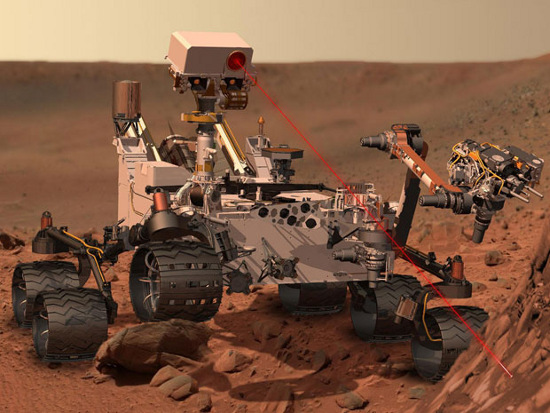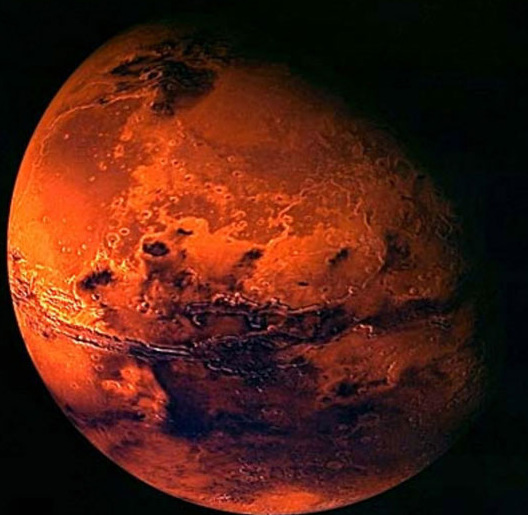Migrate Earth bacteria to Mars
Scientists are investigating the possibility of creating life on Mars by "migrating" Earth's bacteria to it.
Since landing at Mars last summer, the Curiosity robot has been 'scouring' the Gale Crater area. However, one thing has worried many people since Curiosity was launched: what will happen if Curiosity causes the surface of Mars to be poisoned by life on Earth?
Mars and Earth are two completely different planets. Mars is dry and cold. Its surface pressure is 1,000 times lower than the pressure at sea level on Earth. The temperature on it is low enough to freeze carbon dioxide and it has absolutely no oxygen.

What if bacteria that live on Curiosity can survive on Mars?
Wayne Nicholson and Andrew Schuerger, two University of Florida biologists, wanted to find out if Earth's bacteria could survive on Mars.
They decided to select the type of bacteria that lived in the permafrost in the polar region of Russia, collected at a depth of 12m. These bacteria were initially nourished in a nutrient-rich environment in the Earth's climate within 28 days. Then 10,000 bacteria were 'migrated' to live in the same environment as Mars, at a temperature of 0 degrees Celsius, about 7 millibars, within 30 days.
6 out of 10,000 of these bacteria, the carnobacterium line survived in that harsh condition. In fact, this bacterium grows very well in low pressure environments and without oxygen. The cause of this is still unclear. Schuerger said: 'Under conditions of low pressure, some mysterious mechanism has helped these bacteria grow their size.'
6 / 10,000 is not necessarily a success rate, but that is enough to prove that bacteria on Earth can survive under such low pressure.
Often spacecraft are 'sterilized' to avoid any poisoning, however, NASA's loss of contact with Curiosity is enough to prove that in the six months before the launch of Mars, the drill of Curiosity may have been infected with bacteria.

Many types of Earth bacteria can "live well" in climatic conditions on Mars.
This is an entirely possible possibility, when life from one planet can 'migrate' to another, although we may not know why.
Schuerger and Nicholson conducted an experiment in parallel with the experiment. They tested 26 types of bacteria that normally lived on spacecraft, brought them to live in extreme conditions like on Mars and found that a species of bacteria called Seeratia liquefaciens could survive and thrive under conditions. live this.
The biggest difference in actual living conditions on Mars and in the experiment is moisture. These bacteria only survive in conditions of high humidity while Mars is extremely dry. But we should remember, the Phoenix detector has detected us in the permafrost layer on Mars with water. Who knows, these bacteria can survive here.
'On Mars there are 17 elements that can kill bacteria, and we should thoroughly examine these factors to see how they affect the growth of bacterial species,' says Schuerger.
- Earth bacteria travel to Mars
- The risk of spreading bacteria from Earth to Mars
- Should humans abandon the Earth and find another planet to live on?
- Discovered an algae that lived up to 2 years in space
- 'That' on Mars will be dangerous, but it can create new subspecies of humans
- People on Mars are also not sure to avoid apocalypse?
- Curiosity may have brought bacteria to Mars
- Methan bacteria can survive under the environmental conditions of Mars
- Mars and the earth come together
- Taimyr bacteria are capable of living on Mars
- How to transform Mars into a Second Earth
- New discovery of life survival under the surface of Mars
 Van Allen's belt and evidence that the Apollo 11 mission to the Moon was myth
Van Allen's belt and evidence that the Apollo 11 mission to the Moon was myth The levels of civilization in the universe (Kardashev scale)
The levels of civilization in the universe (Kardashev scale) Today Mars, the sun and the Earth are aligned
Today Mars, the sun and the Earth are aligned The Amazon owner announced a secret plan to build a space base for thousands of people
The Amazon owner announced a secret plan to build a space base for thousands of people